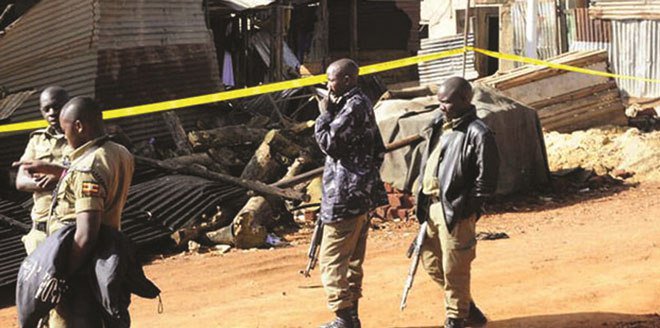
Muslims are the second largest religious community with 12.1%, followed by traditional affiliations at 1.0%, a minute 0.1% for the Baha’i faith and finally atheists at 0.9% according to the 2014 national population census.
The raid on Usafi Mosque appears to have re-opened old wounds in the Muslim community which claims the government is determined to sustain a narrative in the country that the Muslim community is connected to some of these heinous crimes recently reported in the media.
Since the 2010 twin World Cup final bombings by Al-Shabab in Kampala left hundreds of revelers dead, analysts say the government has taken a hardline stance on Islamic fundamentalism. A high number of Muslims are languishing in jails.
But the confrontations between radical Muslims and the government go back a long way and various governments; from the colonial period to today, have attempted to resolve them with varying levels of success. Some of them started out as Muslim versus Muslim wrangles and sucked in the government. In the early 1990s, for example, Jamilu Mukulu led a group of Tabliq youth to forcefully takeover the headquarters of the Uganda Muslim Supreme Council in Kampala. When, police intervened, the youth slaughtered one officer and two dogs before they were arrested. Their leader at the time, Muhammad Kamoga fled to Kenya.
Still, Ibrahim Ssemujju Nganda, the MP for Kira Municipality and the Opposition Chief Whip says the mosque raid is part of the continuing profiling of Muslims and every mosque “as a place where crimes are being committed.”
“If you find there are one or two people who are suspected to have committed a crime, do you invade a mosque?
Semujju told The Independent on May 09 that Museveni does not like Muslims.
“That is why he looks at Muslims as the first suspects when heinous crimes happen around the country,” he said.
Muwanga Kivumbi, the MP for Butambala County who also doubles as the shadow minister for Internal Affairs also told The Independent that the Usafi mosque attack is part of Museveni’s long-term plan to market himself around the world as a “firewall” against the expansion of Islam in sub-Saharan Africa.
According to Kivumbi, raids such as that on the mosque help Museveni to brand himself as one of the leading fighters of jihadists and political Islam. Kivumbi said Museveni’s story is always helped by the presence of ADF. Kivumbi says the ADF hype is intended to feed into the Western fight against Islamic fundamentalism.
Lubega Medard Ssegona, the MP for Busiiro County East and shadow minister for Justice and Constitutional Affairs also says the mosque attack smirks of offensive “religious profiling”.
“What the security agencies are doing is religious profiling and this is offensive. It is important for the security agencies to do thorough investigations instead of branding everyone a criminal.”
Several Muslim clerics have been jailed over acts of terrorism. Last November, Sheikh Yunus Kamoga and three members of the Tabliq sect were convicted of murdering nine Muslim clerics, Joan Kagezi, and an army officer who had defected from the ADF.
But Ladislaus Rwakafuzi, a human rights lawyer, said the evidence for Muslim involvement in the high profile killings is flimsy. He said Muslims were being profiled by the state.
“It’s an easy way out to show to the public that you’re doing something about these killings.”
Mohammed Ndifuna, a human rights activist based at the Human Rights Network-Uganda, told The Independent on May 10 that what is emerging in Uganda is a situation where there is “|collective victimization and collective guilt for certain groups of society like the Muslims.”
Ndifuna says accusing Muslims is the easiest way to get more funds for the police.
“It is high time this bluff was called on the state and its operatives,” he says but adds that Muslims who commit crimes should be tracked, arrested and produced before competent courts of law.
“If you go to Luziira Maximum Prison, you will find that the hardcore criminals do not belong to one particular religion or they may not even believe in anything despite the fact that they carry a particular name.”
National leaders of Muslims have distanced themselves from the Usafi Mosque. Hajji Nsereko Mutumba, the Spokesperson of the Uganda Muslim Supreme Council told The Independent on May 11 that although all Juma mosques in Uganda are supposed to be under their umbrella, the Usafi mosque was not part of their more than 11,000 mosques that are under their stable.
“Our position is that we do not protect anybody who has committed crime as long as someone is proven guilty beyond reasonable doubt but we are against labeling a “Mohammed” as a terrorist yet a “Herbert” who has committed the same crime is a mere criminal.”
Solomon Asiimwe, a senior lecturer of governance at Uganda Martyrs University agrees.
“Crime is crime. I am sure there are good Muslims just like there are bad Muslims and there are bad Christians as there are good Christians,” he told The Independent.
 The Independent Uganda: You get the Truth we Pay the Price
The Independent Uganda: You get the Truth we Pay the Price





